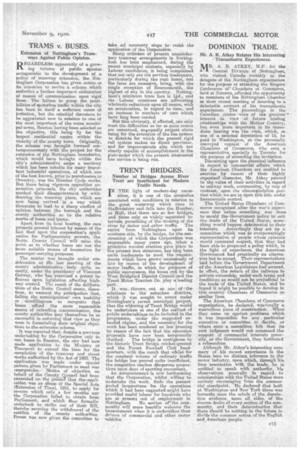TRENT BRIDGES.
Page 39

If you've noticed an error in this article please click here to report it so we can fix it.
Number of Bridges Across River Trent are Insufficient for Modern Traffic Needs.
IN THE light of modern-day neces sities, it is one of the anomalies associated with conditions in relation to the great waterway which rises in Staffordshire and falls into the Hunther, at Hull, that there are so few bridges, and those only at widely separated intervals; permitting of the crossing of the river by motor and .other traffica The cnOlet from 'Nottingham upon its southern side, by the bridge, for the construction of which the Corpora ion -was responsible many years ago, when a primitive wooden erection gave place to the present iron structure, has 1 ng been quite inadequate to meet the requirements which have grown enor usly of late by reason of the devel.opient of motor traffic, in which for purposes of public conveyance, the buses rui by the West Bridgford District Council and the Trent Motor Traction Co. play a leading
Paxt. It was thrown. out as one of the
solatiums to the suburban districts, which it was sought to annet under Nottingham's recent municipal. sroject, that, the widening of Trent Bridg would be undertaken as one of the eatliest of public undertakings tole includ in the programme, under the suggested extended regime, and the necessityl for the work has been Tendered no less pressing by reason of the fact that the nitension proposals have now been tern jorarily checked. The 'bridge is contigious to the historic Trent Bridge cricket ground and the Forest Football Clul head. quarters, with the result that whilst for the constant volume of ordinary traffic the bridge has proved quite insufficient, the congestion reaches dangerous proportions upon days of sporting encounters. An annommement is now forthcoming that the Corporation, whilst willing to undertake the work, finds the present period inopportune for the operations which it had been suggested might have provided useful labour for hundreds who are at present out of employment in Nottingham. No section oP the community will more heartily welcome the imnrovement when it is undertaken than dr:vers of commercial and other motor vehicles.


























































